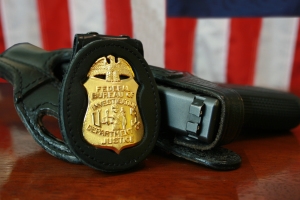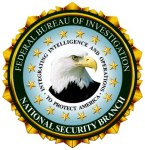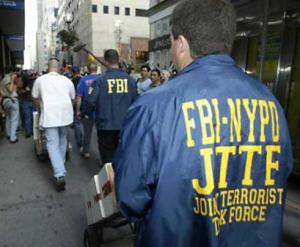Two Navy Guys Talk About the FBI and Combating Terrorism
 Welcome back to Two Navy Guys and a Novel, the place where you get to watch two ex-Navy guys write a military-political thriller. If this is your first visit with us, drop by the website to catch up on all the past episodes.
Welcome back to Two Navy Guys and a Novel, the place where you get to watch two ex-Navy guys write a military-political thriller. If this is your first visit with us, drop by the website to catch up on all the past episodes.
Speaking of the website, you’ll notice some new features on the writing Progress-O-Meter. The length of the first draft has been updated from 90,000 word target to a 110,000 word target. (So much for best laid plans and all that.) You’ll also find a new progress meter for the second draft process, which is getting kicked off this week. We’ll talk in a future blog post about our second draft process and how we manage a collaborative second draft. (Hint: it ain’t easy).
But today, JR is here to take us to school again, this time on an FBI beastie known as a JTTF.
The FBI in a Post-9/11 World
As we’ve discussed in previous posts, 9/11 sparked a sea change in the US intelligence community, and nowhere was this felt more acutely than in the Federal Bureau of Investigation, or FBI. Until that time, while the FBI was the lead agency charged with dealing with foreign intelligence operatives on US soil, the FBI saw its primary mission as one of law enforcement, not intelligence.
In the aftermath of 9/11, both the FBI and the CIA were called out for failing to “connect the dots” regarding the hijackers. Following the recommendations of the 9/11 Commission, as the reorganized US intelligence community began to prioritize information sharing between agencies, the FBI created the National Security Branch (NSB) to group all their national security operations under one leader.
 In addition to the NSB, the FBI also stepped up its game at the state and local level using an interagency body known as the Joint Terrorism Task Force, or JTTF. The JTTF concept was not new—the first was established in New York City in 1980—but since 9/11, they’ve become a key component in combating terrorism. In the words of the FBI website, the JTTFs are: our nation’s front line on terrorism: small cells of highly trained, locally based, passionately committed investigators, analysts, linguists, SWAT experts, and other specialists from dozens of U.S. law enforcement and intelligence agencies.
In addition to the NSB, the FBI also stepped up its game at the state and local level using an interagency body known as the Joint Terrorism Task Force, or JTTF. The JTTF concept was not new—the first was established in New York City in 1980—but since 9/11, they’ve become a key component in combating terrorism. In the words of the FBI website, the JTTFs are: our nation’s front line on terrorism: small cells of highly trained, locally based, passionately committed investigators, analysts, linguists, SWAT experts, and other specialists from dozens of U.S. law enforcement and intelligence agencies.
Translation: these guys are Johnny-on-the-spot for any sort of terrorist-related activity. Today, there are 104 JTTFs across the country, including at least one in each of the 56 FBI field offices, and have about 4000 members from 55 different federal agencies.
The Minnesota Angle
 Here in Minnesota, we are home to two JTTF offices. In my role as an educator, I’ve had the chance to meet a number of JTTF agents and get familiar with their work.
Here in Minnesota, we are home to two JTTF offices. In my role as an educator, I’ve had the chance to meet a number of JTTF agents and get familiar with their work.
It’s easy to think of an FBI agent as a Hollywood stereotype: a beefy white guy with a gun and dark glasses, kicking in doors and arresting people. Banish the thought. Yes, the FBI has a role in law enforcement, but a growing aspect of the FBI’s role is community outreach. After all, the best way to combat terrorism is to make community safety a community responsibility.
As an example, I was recently invited as a panelist by Metropolitan State University’s School of Law Enforcement and Criminal Justice to discuss the issue of homegrown radicalization and terrorism. On the panel with me were: a local imam, a policy aide for the Minneapolis City Council, a mental health professional, and—you guessed it—an FBI agent. The evening was a fascinating discussion about preventing terrorism before it even starts, through local action and local initiative.
Meanwhile, Back in the Fictional World of WMD
In fiction, we tend to look at the dark side of life. We describe people in the worst kind of conflict, at the moment when the system breaks down and it looks like evil will surely triumph over good this time. Weapons of Mass Deception is no exception to the rule. Our story describes the radicalization of a young man, his path to the dark side, and an action-packed ending.
David Bruns is the creator of the sci-fi series The Dream Guild Chronicles, and one half of the Two Navy Guys and a Novel blog series about co-writing the military thriller, Weapons of Mass Deception. Check out his website for a free sample of his work.

